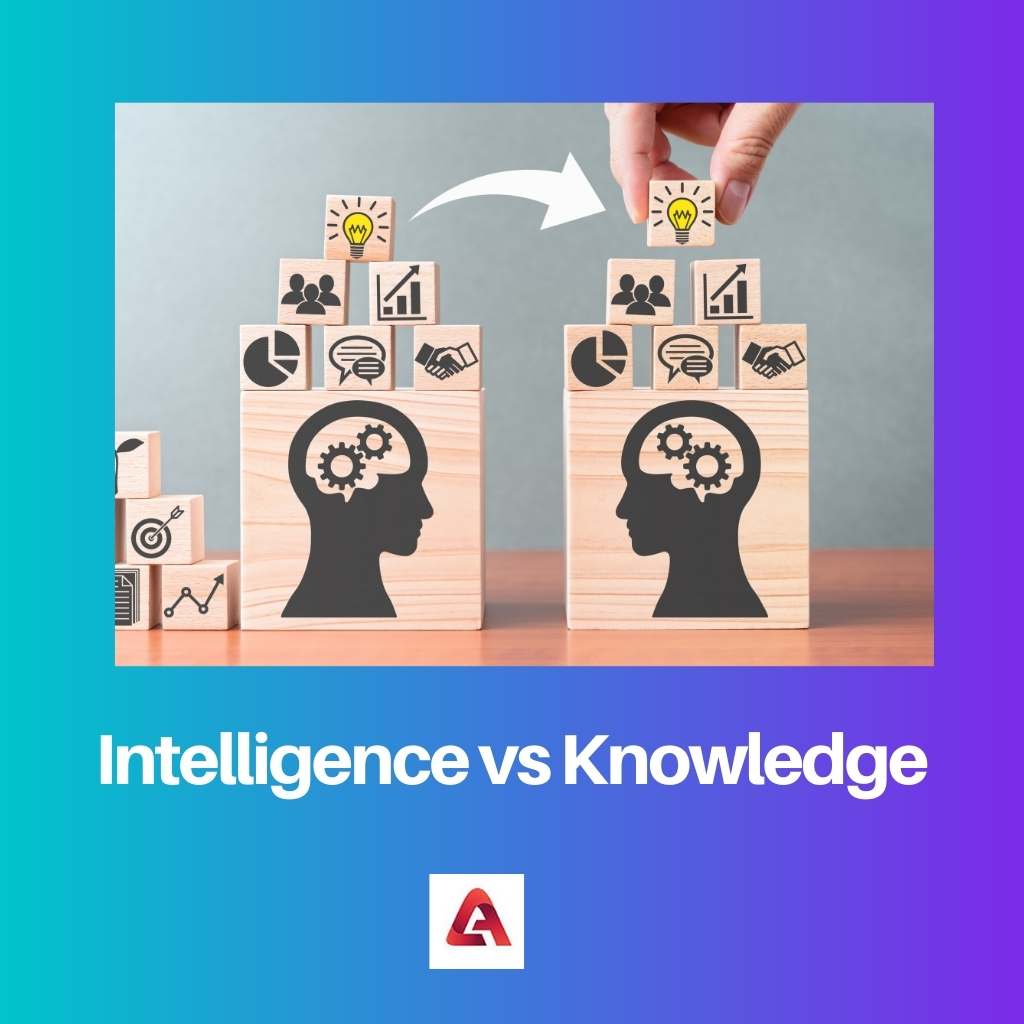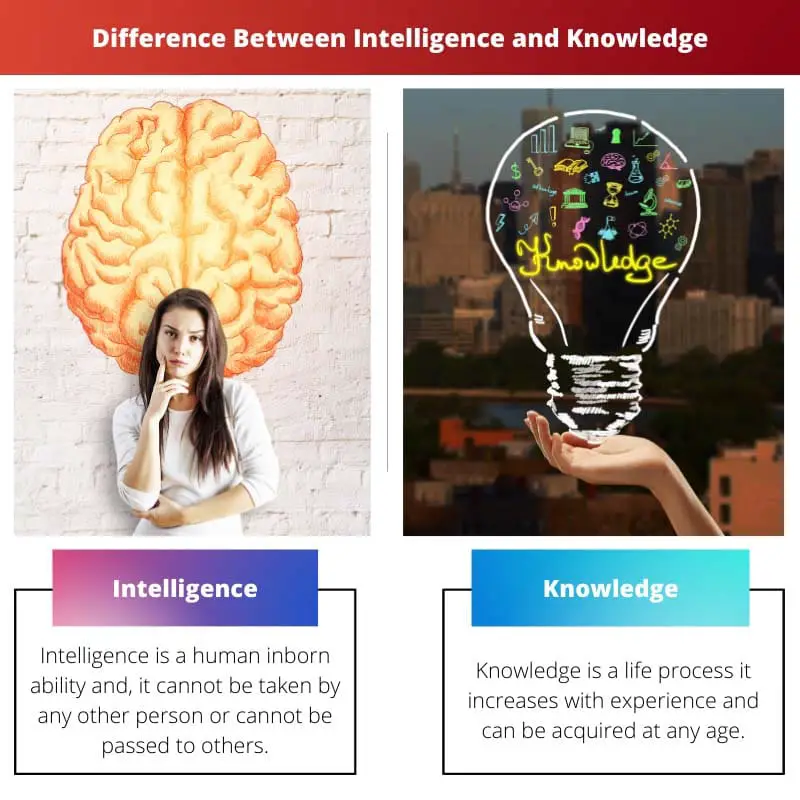The human brain is a more complex organ when compared to other organs in the human body. It contains many nerves and receptors, enabling us to think and respond. During our whole life, we make memories in our brain, and our brain stores them as our experiences.
Intelligence and Knowledge are also related to our brain activities or brain functioning. These two terms are similar but a little bit different. Intelligence is a human brain’s function to acquire knowledge and learn new things, whereas Knowledge is the storage of intelligence or experiences human gains.
Key Takeaways
- Intelligence is a natural ability to learn and solve problems, while Knowledge is acquired through learning and experience.
- Intelligence is a more innate and fixed trait, while Knowledge can be improved through education and training.
- Intelligence is more related to cognitive abilities, while Knowledge is more related to factual information.
Intelligence vs Knowledge
The difference between Intelligence and Knowledge is that Intelligence is not the same in every human being, and it can also be measured by checking the IQ level of a human brain. On the other hand, the Knowledge of a human being cannot be measured by any means. It can only be tested.

The Intelligence of a person can be high in many fields like problem-solving, gaining knowledge, reasoning, and, many more. It differs from person to person and sometimes age factor also. Your intelligence shows how you store things in your brain and how correctly it responds to things that you do.
Knowledge is limitless. Any person of any age can have an abundance of knowledge and can gain more. It is a lifelong process and does not end. Mainly it is defined as an ability to know or understand something and take it with you as an experience. No one can steal it from you.
Comparison Table
| Parameters of Comparison | Intelligence | Knowledge |
|---|---|---|
| Procurement | Intelligence is a human inborn ability and, it cannot be taken by any other person or cannot be passed to others. | Knowledge is a life process it increases with experience and can be acquired at any age. |
| Specialty | The specialty of Intelligence is its distinctiveness to individual human beings. | The specialty of Knowledge is that it can vary from person to person but can also be the same at the same time. |
| Developed by | Intelligence cannot be developed. It is an inborn ability of a human species. | Knowledge is gained or developed by constant hard work and practice. |
| Functions | Intelligence functions as a way of solving problems and finding ways to deal with the complexity of any situation. | Knowledge functions as a way of knowing situations and analyzing them or tackling them. |
| Measuring ways | Intelligence can be measured in many ways, one of them is the intelligent quotient test. | Knowledge cannot be measured it can only be checked or tested. |
What is Intelligence?
Intelligence is the art of knowing about a particular object or thing, not just at the surface level but at the operational level. A person’s intelligence is considered to be rare because everybody does not have it and cannot possess it. Intelligence can be inherited but cannot be acquired.
Intelligence does not require guidance or consultancy from any other person in any situation. Apart from human beings, intelligence can be seen in animals and plants. Animals like octopuses, chimpanzees, and dolphins are considered the world’s most intelligent species in the category of animals.
Machines like robots and computers also possess intelligence and, which is called artificial intelligence. Perlmutter, a supercomputer, is considered to be the most strong AI possessing machine.

What is Knowledge?
Knowledge can be associated with grasping things or specific topics. Knowledge can be obtained with the help of books, documents, education, and practice, etc. Several exams are taken to test human knowledge, and based on that, jobs are provided to them.
There are various types of knowledge, like scientific, social, situated, religious, etc. A famous proverb about knowledge is that ‘partial knowledge is a dangerous thing.’ Therefore, a person should exhibit full knowledge before educating others or solving any situation.
We gain knowledge from others’ intelligence and knowledge. It helps us tackle situations we are familiar with, and through knowledge, one can achieve success.

Main Differences Between Intelligence and Knowledge
- Intelligence is a human inborn or natural ability, and any other person cannot take it or cannot be passed to others. And Knowledge is a life process it develops with experience and can be acquired at any age.
- Knowledge is gained or developed by constant hard work and practice. Whereas Intelligence cannot be developed by practice as it is an inborn ability.
- The uniqueness of Intelligence is its distinctiveness to individual human beings. In contrast, the uniqueness of Knowledge is that it can vary from person to person but can also be the same in the meantime.
- The knowledge of an individual cannot be calculated. It can only be checked or tested. Whereas Intelligence can be measured in many ways, one of them is the intelligence quotient test.
- Intelligence functions as a way of solving problems and finding ways to deal with the complexity of any situation. While Knowledge functions as a way of knowing situations and analyzing them.

- https://psycnet.apa.org/record/2012-27019-007
- https://onlinelibrary.wiley.com/doi/abs/10.1002/9781405164863.ch3

This post is a good addition to the literature on intelligence and knowledge and the human brain’s functioning. The explanation about the uniqueness of intelligence and knowledge is well presented.
This article discusses the differences between intelligence and knowledge in a clear and concise manner. It delves into many aspects of them both, and I appreciate that.
A very interesting article on the differences between intelligence and knowledge. It is always a great experience to read about the complex workings of the human brain. I found the comparison table useful.
This article provides a thorough overview and distinction between intelligence and knowledge. It would be interesting to learn more about the references.
One of the best explanations on the differences and relationship between intelligence and knowledge that I have ever read. The Key Takeaways, and Comparison Table are particularly interesting.